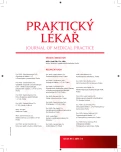Commission health assessment by medical assessor committees
Authors:
L. Čeledová; R. Čevela
Authors‘ workplace:
Přednostka: doc. MUDr. Libuše Čeledová, Ph. D.
; Lékařská fakulta v Plzni
; Ústav sociálního lékařství
; Univerzita Karlova v Praze
Published in:
Prakt. Lék. 2015; 95(6): 267-271
Category:
Of different specialties
Overview
The article informs about the expert committees of the Ministry of Labour and Social Affairs. The authors describe the history of expert committees and examine the reasons for its further existence. The committee are the only authority, where about the outcome of the assessment of the health status of a citizen decides the vote. Member of the Committee is also non-medical person – Secretary. She/he is the employee of Medical Assessment Service.
The role of Secretary of the Commission is very important. Secretary to participate and vote on assessor concludes. Composition of expert committees and the way that they make decisions about the assessor concludes on the basis of voting may call up ethical dilemmas. The authors also point to the existing organizational integration of expert committees, which is contrary to the principles of public administration. Authors propose the transfer of expert committees MoLSA to the Czech Social Security Administration (CSSA). This would lead to the unification of organizational components of the medical assessment service with one employer and streamline operations of Medical Assessment Service.
Keywords:
Medical Assessment Service – advisory committee – Ministry of Labour and Social Affairs (MoLSA)
Sources
1. Čeledová L. Posudková činnost v ordinaci praktického lékaře. Manuál pro oblast sociálního zabezpečení a zaměstnanosti. Praha: Grada Publishing 2015 : 210.
2. Čeledová L, Čevela R, Ornerová A. Roční zkušenosti s posuzováním stupně závislosti pro účely příspěvku na péči. Prakt. Lék. 2014; 94(2): 84–87.
3. Čevela R, a kol. Sociální a posudkové lékařství. Praha: Karolinum 2015 : 159.
4. Langer R. Lékařská posudková služba. Kompetence Lékařské posudkové služby od 1. ledna 2012 – část 1. Národní pojištění 2012; 43(1): 23–25.
5. Langer R. Lékařská posudková služba. Kompetence Lékařské posudkové služby od 1. ledna 2012 – část 2. Národní pojištění 2012; 43(2): 19–21.
6. Langer R. O vývoji právní úpravy posudkových komisí – 1. část. Národní pojištění 2015; 46(4): 19–23.
7. Langer R. O vývoji právní úpravy posudkových komisí – 2. část. Národní pojištění 2015; 46(5): 23–27.
8. Ministerstvo práce a sociálních věcí ČR. Metodický pokyn pro postupy posudkových komisí MPSV při posuzování zdravotního stavu pro účely opravných řízení, 2013.
9. Ptáček R, Bartůněk P, a kol. Etické problémy medicíny 21. století. Praha: Grada Publishing 2014; 520.
10. Ptáček R, Bartůněk P, a kol. Etika a komunikace v medicíně. Praha: Grada Publishing 2011; 528.
11. Seifert B, Čeledová L, a kol. Základní pojmy praktického a posudkového lékařství. Praha: Karolinum 2012; 193.
12. Veselý J. Právo sociálního zabezpečení. Praha: VŠAP 2009; 201.
13. Veselý J. K právní povaze posudku o zdravotním stavu ve věcech sociálního zabezpečení. Zdravotnictví a právo 2009; 13(4): 18–21.
Labels
General practitioner for children and adolescents General practitioner for adultsArticle was published in
General Practitioner

2015 Issue 6
- Advances in the Treatment of Myasthenia Gravis on the Horizon
- Hope Awakens with Early Diagnosis of Parkinson's Disease Based on Skin Odor
- Memantine in Dementia Therapy – Current Findings and Possible Future Applications
- Possibilities of Using Metamizole in the Treatment of Acute Primary Headaches
- Memantine Eases Daily Life for Patients and Caregivers
-
All articles in this issue
- Betaglucans – immunomodulatory substances in prevention and support treatment
- Gastric surgery at present
- Malignant tumours – strategy and preventive programmes in the Czech Republic
- Opinions and attitudes of Czech citizens on the issue of health and healthy lifestyles
- How to fulfil a legal duty to inform patient writing his/her previous expressed wish?
- Commission health assessment by medical assessor committees
- Psychological aspects of malignant vasovagal syncopes
- Changes in body composition and eating habits of obese patients after intragastric balloon insertion
- The reliability of the Czech version of the General-Food Craving Questionnaire-Trait
- Patient with abdominal aortic aneurysm – diagnostics, follow-up and treatment in the ambulance of general practitioner
- General Practitioner
- Journal archive
- Current issue
- About the journal
Most read in this issue
- Gastric surgery at present
- Betaglucans – immunomodulatory substances in prevention and support treatment
- Commission health assessment by medical assessor committees
- Patient with abdominal aortic aneurysm – diagnostics, follow-up and treatment in the ambulance of general practitioner
